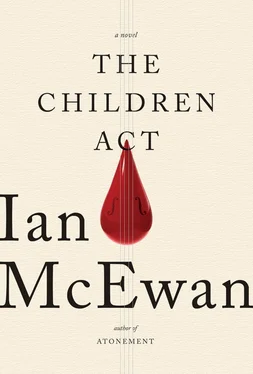Pauling said, “It’s that Jehovah’s Witness lad, Adam Henry. Do you remember, from the transfusion case? He seems to have followed you here. He’s been walking through the rain, completely drenched. They wanted to turn him out, but I thought you should know first.”
“Where is he now?”
“In the kitchen. It’s warmer there.”
“Better bring him in.”
As soon as Pauling had left she got up and walked slowly around the room, conscious that her heart rate had increased. If she’d answered his letters she wouldn’t have been facing this now. Facing what? Unnecessary involvement with a case that was closed. And more than that. But there was no time to consider. She heard footsteps approaching.
The door swung open and Pauling ushered in the boy. She had never seen him out of bed and was surprised by how tall he was, well over six feet. He wore his school clothes, gray flannel trousers, gray sweater, white shirt, a flimsy school blazer, all soaked through, and his hair was untidy from being rubbed dry. A small backpack drooped from his hand. A pathetic touch was the Leadman’s tea towel, printed with a collage of local beauty spots, draped across his shoulders for warmth.
The clerk hovered in the doorway while the boy took a couple of steps into the room and stopped close to where she stood and said, “I’m truly sorry.”
In those first moments it was easier to conceal a confusion of feeling behind a motherly tone. “You look frozen. We’d better have them bring that heater in here.”
“I’ll bring it myself,” Pauling said, and left.
“Well,” she said after a silence. “How on earth did you find me here?”
Another evasion, to ask how rather than why, but at this stage, while his presence was still a shock, she couldn’t face knowing what he wanted from her.
His recitation was sober. “I followed you in a taxi to King’s Cross, got on your train, no idea where you’d get off so I had to buy a ticket to Edinburgh. At Newcastle, I followed you out through the station entrance, ran after your limo, then I lost it, so I took a guess and asked people where the law courts were. As soon as I got there I saw your car.”
She watched him as he spoke, taking in the transformation. No longer thin, but still slender. New strength about the shoulders and arms. Same long delicately structured face, the brown cheekbone mole nearly invisible against a complexion darkened by young health. Mere traces of the purple pouches under the eyes. Lips full and moist, eyes in this light too black for color. Even when he was trying to be apologetic, he appeared too vivid, too hungry for the minutiae of his own explanation. As he looked away from her to order in his thoughts the sequence of events, she wondered if this was what her mother would have called an old-fashioned face. A meaningless idea. Everyone’s notion of the face of a Romantic poet, a cousin of Keats or Shelley.
“I waited a really long time, then you came out and I followed you through the town and back down toward the river and watched you get in the car. It took me more than an hour, but eventually I found a site on my phone that mentioned where the judges stay, so I hitched a lift, got dropped off on the main road, climbed over the wall to avoid going past that gatehouse and walked up the drive in the storm. I waited round the back by the old stables for ages, wondering what to do, and then someone saw me. I really am sorry. I…”
Pauling, flushed and irritable, came in with the heater. He may have needed to wrench it from the butler’s possession. They watched as the clerk went down on all fours with a grunt, and partly disappeared under a side table to get to a socket. After he had reversed out and stood, he placed his hands on the young man’s shoulders and steered him into the flow of warm air. Before he left he said to Fiona, “I’ll be right outside.”
When they were alone she said, “Shouldn’t I think there’s something spooky about you following me home, and then here?”
“Oh no! Please don’t think that. It’s not like that.” He cast around with an impatient movement, as though an explanation were written somewhere in the room. “Look, you saved my life. And it’s not only that. My dad tried to keep it from me, but I read your judgment. You said you wanted to protect me from my religion. Well, you have. I’m saved!”
He laughed at his own joke and she said, “I didn’t save you so that you could stalk me the length of the country.”
Just then a fixed component of the fan heater must have expanded into the orbit of a moving part, for a regular clunking sound filled the room. It grew louder, then diminished, then steadied. She felt a rush of irritation with the whole establishment. A fake. A dump. How had she not noticed before?
The moment passed and she said, “Do your parents know where you are?”
“I’m eighteen. I can be where I like.”
“I don’t care how old you are. They’ll be worried.”
He gave a gasp of adolescent exasperation and set his backpack down on the floor. “Look, My Lady—”
“Enough of that. It’s Fiona.” As long as she could keep him in his place she felt better.
“I wasn’t meaning to be sarcastic or anything.”
“Fine. What about your parents?”
“Yesterday I had this huge row with my dad. We’ve had a few since I came out of hospital, but this one was really big, both shouting, and I told him everything I thought about his stupid religion, not that he was listening. In the end I walked out. I went up to my room and packed my bag, got my savings and said good-bye to my mum. Then I left.”
“You must phone her now.”
“No need. I texted her last night from where I was staying.”
“Text her again.”
He looked at her, both surprised and disappointed.
“Come on. Tell her you’re safe and happy in Newcastle and you’ll write again tomorrow. Then we’ll talk.”
She stood a few paces off and watched as his long thumbs danced across a virtual keyboard. In seconds the phone was back in his pocket.
“There,” he said, looking at her expectantly, as though she were the one who was to give an account of herself.
She crossed her arms. “Adam, why are you here?”
His gaze slid away and he hesitated. He was not going to tell her, or not directly.
“Look, I’m not the same person. When you came to see me I really was ready to die. It’s amazing that people like you could waste your time on me. I was such an idiot!”
She gestured toward two wooden chairs by an oval walnut table and they sat facing each other across it. The ceiling light, a factory-stressed rustic wheel of stained wood bearing four energy-conserving lamps, cast down from one side a ghastly white glow. It heightened the contours of his cheekbones and lips, and picked out the fine twin ridges of his philtrum. It was a beautiful face.
“I didn’t think you were an idiot.”
“But I was. Whenever the doctors and nurses tried to talk me round, I felt sort of noble and heroic telling them to leave me alone. I was pure and good. I loved it that they couldn’t understand how profound I was. I was really pumped up. I liked it that my parents and the elders were proud. At night when no one was around I rehearsed making a video, like suicide bombers do. I was going to do it on my phone. I wanted it on the television news and at my funeral. I made myself cry in the dark, imagining them carrying my coffin past my parents, past my school friends and teachers, the whole congregation, the flowers, the wreaths, the sad music, everyone weeping, everyone proud of me and loving me. Honestly, I was an idiot.”
“And where was God?”
“Behind everything. These were his instructions I was obeying. But it was mostly about the delicious adventure I was on, how I would die beautifully and be adored. This girl I know at school had anorexia three years ago, when she was fifteen. Her dream was of wasting away to nothing—like a dried leaf in the wind, was what she said, just fading gently into death and everyone pitying her and blaming themselves afterward for not understanding her. Same sort of thing.”
Читать дальше












